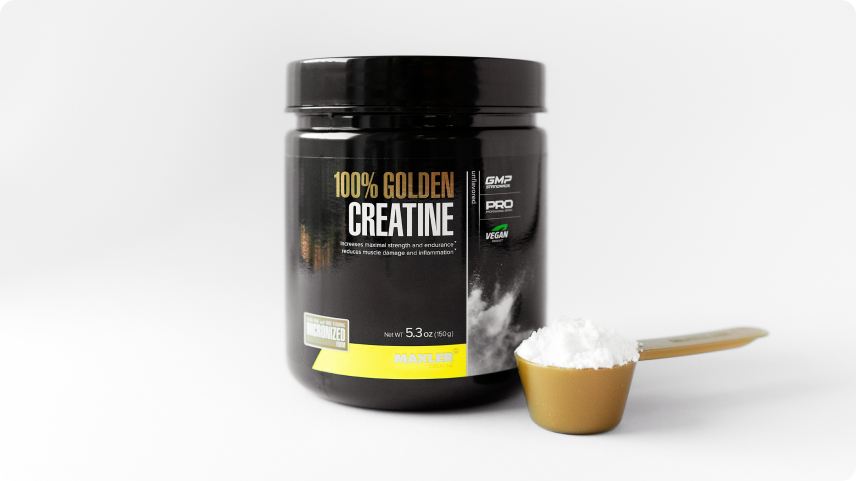Best Creatine Supplements in 2024

Creatine is a powerful addition to an athlete’s arsenal – it can boost performance, help grow muscle mass, and support your goals. It's a commonly used supplement, with anywhere between 8 and 74% of athletes and exercise enthusiasts using creatine. Yet myths and misconceptions about creatine still run rampant in the athletic and exercise communities. Let's help you better understand creatine and its benefits and pick the best creatine supplements in 2024 so you can take your performance to a new level.
What Is Creatine?
Creatine is an amino acid made from glycine, arginine, and methionine in our liver. We can also get this amino acid from food, with a typical diet providing around 1 or 2 grams of creatine daily. The main food sources of creatine are meats and seafood. Creatine doesn't directly get incorporated into the muscle. Rather, it is stored in our muscles, brain, liver, kidneys, and testes, either in the form of free creatine or phosphocreatine.
Creatine supports our muscle function. When you do a short burst of exercise at high intensity, your body uses ATP. ATP is a molecule that “stores” chemical energy that the cell can use to power processes like muscle contraction. When ATP is used up, it breaks down into ADP and a singular phosphate. However, the muscle cells need to restore ATP for a continuous supply of energy.
Creatine helps with this process. Creatine combines with the free phosphate to form phosphocreatine. Phosphocreatine can then help regenerate ATP quickly to help you perform. When we use creatine supplements, we increase our muscle stores of creatine and phosphocreatine, which are responsible for the beneficial effects of the substance.
Benefits of Creatine
Creatine is a widely used sports supplement with a range of benefits that concern the athlete. However, it also benefits general health, and we learn more about these daily. So, what are the benefits of creatine?
Athletic Benefits of Creatine
Creatine is best known for its athletic benefits, so it’s no wonder that it is popular with the athletic community. Whether you’re playing a sport, trying to improve recovery or sculpting your body for the next competition, creatine may come in handy for you.
Creatine helps improve muscle adaptation, which means that athletes can do more work during training. The extra work leads to improvement in strength, muscle mass, and performance. It appears to be effective for power and strength athletes and those who need to sprint from time to time during their games. Therefore, creatine can be beneficial for many types of sports.
Creatine can support muscle growth. Combining creatine and resistance training increases insulin-like growth factor, which is crucial for muscle growth. It can be especially effective for those whose diets are primarily plant-based. If your goal is to grow muscle, creatine is a great assistant in accomplishing your goals.
Creatine also benefits recovery. Those who train a lot need to recover quickly between sessions. Combining creatine and carbohydrates can help increase both creatine and carb storage in muscle. Sufficient glycogen is essential in promoting recovery and preventing overtraining. Creatine may also help reduce muscle damage and enhance recovery on its own. It can help maintain performance during initial high-volume training, which usually results in performance decrements.
Benefits for the Brain
Creatine may benefit the brain. Our neurons require a lot of energy to carry out their function, and creatine administration can increase the energy supply to neurons. It appears that creatine supplementation can improve short-term memory and intelligence or reasoning capacity of healthy people. Creatine supplementation may also support cognitive function and processing speed when sleep deprivation occurs.
Therefore, some benefits may be associated with creatine usage for supporting cognition and brain activity.
For Women
Women can get all the ergogenic benefits from creatine, improving both strength and exercise performance. In addition to that, it may support bone health if paired with resistance training. The female menstrual cycle may affect creatine homeostasis in the body, and it appears that supplementation may be critical during periods, pregnancy, post-partum and post-menopause.
Creatine for women may also be useful for fertility, as the tissues within the reproductive system require plenty of energy. However, this is a relatively new field, and more research is still needed to assess how useful creatine can be.

For Men
Creatine usage is quite common in men, and most of the scientific experiments to do with creatine have been performed in men. Therefore, men can obtain the ergogenic benefits associated with creatine. Men can use creatine to increase sport performance, grow muscle and adjust their body composition.
There are, however, some pressing concerns associated with creatine supplementation that men may have. These may be the results of myths spread through the gym communities that may affect what you think about creatine. So, what are the everyday things people worry about with creatine supplementation?

- Water retention. Many people worry that creatine supplements will increase their weight through water retention. While creatine does appear to increase water retention, this effect may be temporary and occur only at the start of supplementation.
- Creatine and steroid status. Creatine is not an anabolic steroid, even if many athletes may assume that it is. Anabolic steroids are synthetic versions of testosterone, whereas creatine is not.
- Creatine and baldness. Some people may worry about baldness induced by creatine usage. Current evidence does not suggest that creatine causes hair loss or baldness.
- Muscle cramping. Some people may believe that people using creatine will experience more dehydration and, therefore, muscle cramping. This myth originated in the 2000s, and so far, there's been no evidence that creatine supplementation can increase the number of muscle cramps.
Types of Creatine Supplements
There are a variety of creatine supplements on the market. It's therefore essential to understand how they differ and which one may suit you. This can help you determine the best type of creatine for you.
A supplement may contain multiple forms of creatine. These include:
- Creatine monohydrate. This is the most researched form of creatine and one of the most popular forms of the supplement. It may come in an anhydrous form, where all water is removed from creatine monohydrate. It is the safest form of creatine and doesn’t appear to have serious side effects.
- Creatine ethyl ester. This form of creatine appears to be better absorbed by the body. This may sound like it should outperform creatine in its benefits. However, it seems that it is worse at increasing creatine levels in the muscle and in the blood. Therefore, this form may not be as effective compared to creatine monohydrate.
- Creatine magnesium chelate. This form of creatine contains additional magnesium, with the creatine being attached to it. It appears to be an effective form of creatine. However, there has not been much research into this form. It's a bit early to say whether it's better than creatine monohydrate.
- Liquid creatine. Some supplements contain creatine that's already dissolved in a liquid. Liquid creatine can sound like an attractive option for busy athletes since all you have to do is drink it straight before a workout. However, it appears to be less effective at supporting performance. This is likely due to creatine breakdown in water over time. Therefore, it's best to mix your creatine supplement before you take it.
- Creatine hydrochloride. Creatine hydrochloride is another form of creatine available on the market. It may be effective for increasing strength gains. One study has found that it appears not to be associated with water retention, which typically accompanies creatine monohydrate supplements. Therefore, creatine HCL may be a good choice for those who play sports where weight categories are important. However, more work has to be done to understand how creatine HCL compares to creatine monohydrate.
There are many different forms of creatine available on the market. Therefore, it’s a good idea to pay attention to what form of creatine you’re actually buying, as not every creatine supplement packaging makes it easy to understand what type of creatine is present.
Creatine supplements can also come in different types.
The most common form of creatine is creatine powder. Powder supplements are easy to use; you just need to dissolve them in water and then drink as required. They make it easy to adjust dosage – all you have to do is measure out more or less creatine. In addition, they can be easily paired with other supplements you may be taking, whether it's a pre-workout, BCAA or another amino acid supplement.
You can also find liquid creatine supplements. Liquid creatine can seem like a good idea – it comes pre-dissolved and is easy to take. However, liquid creatine may not be as effective, as it appears that creatine may break down if it’s in liquid for several days.
Capsule creatine supplements are also a good option. They can be a great option for those who are travelling, as they're easy to carry around. In addition, creatine capsules can be used by those who aren't using creatine for muscle-building purposes, as they may contain smaller doses per capsule.
So, among all the forms and types of creatine, what are the best creatine supplements?
Best Creatine Supplements in 2024
At Maxler, we produce high-quality creatine supplements that have been supporting our customers for years. All of our creatine supplements are vegan, don't contain gluten, and are suitable for most people. Here are our best creatine supplements in 2024.
100% Golden Creatine
100% Golden Creatine is a staple for anyone interested in taking creatine. It contains micronized creatine monohydrate, one of the safest and most-researched forms of creatine, which has been shown to be effective for growing muscle. Micronized creatine is broken down into smaller particles for quicker absorption. This is one of our best creatines for men and women.
100% Golden Creatine comes in the form of a powder, making it easy to add to your routine. In addition, we offer Golden Creatine as both a can that you can keep at home and a box containing single-portion sachets. This can be a game changer for those who need to take creatine with them when travelling, for competitions, or when you're heading to training straight after work. The sachets are easy to carry and use on the go.

Golden Creatine Caps
Golden Creatine Caps offers creatine monohydrate in capsule form. Each serving provides 2.5 grams of micronized creatine monohydrate, which offers quick absorption.
The capsules can be used by those who prefer lower dosages, for example, those aiming to seek other health benefits from creatine. Alternatively, simply adjust the serving size to quickly get the amount of creatine you need.
Alternatively, they are also an excellent option for those who would like to take creatine on the go or when travelling. Golden creatine caps contain the most effective creatine form in easy-to-use capsules.
How to Take Creatine
You may hear different advice on how to take creatine. There are two main ways that people take creatine. One involves a loading phase.
Loading Phase
A loading phase involves five to seven days of a high creatine intake. This is usually around 20-25 grams of creatine per day. For best results, split the creatine into doses of 5 grams and take regularly every few hours. This helps increase skeletal muscle levels of creatine. After the loading phase, take 3-5 grams of creatine daily. A loading phase may be beneficial if you're looking for quick benefits from creatine.
No Loading Phase
Alternatively, you can forgo a loading phase and take a dose of 3-5 grams of creatine daily. Ideally, you'll need to take the creatine supplement for at least four weeks. You will be able to get the same benefits as with a loading phase. However, it will just take more time. This is because smaller doses require longer to increase your muscle's maximum creatine stores. This technique can be helpful for those who are trying to avoid potential weight gain during the "loading" phase.
It's important to remember that you should take creatine every day, even if you’re not training.
When to Take Creatine
Another critical factor is when to take creatine.
On Training Days
When you’re training, it appears that taking creatine around the time you work out is best. This can mean taking creatine slightly before a training session, such as with your pre-workout supplements. Alternatively, you can take it straight after an exercise bout. For example, you can add creatine to a post-workout protein shake.
On Rest Days
When taking creatine on rest days or between training days, timing isn't very important. You may find it easiest to take it at the same time as one of your meals.
During Loading Phase
When you’re creatine loading, you may find that there are times during the day when it's naturally more convenient to take creatine. For example, if you're taking four doses of 5 grams of creatine daily, you can take each dose at a mealtime and one before/after training. This can help you stay consistent with your creatine intake, leading to better results.
Possible Side Effects of Creatine
Are there any side effects of creatine? When you’re considering adding a new supplement into your routine, you need to be aware of potential creatine side-effects.
Some people notice that creatine, especially if they're loading, is that large doses of more than 10 grams of creatine at a time can cause stomach upset and loose stool. You may have heard of side effects like dehydration, muscle cramping or issues with the kidneys. However, none of these claims have held up to analysis, with most works suggesting no link between creatine and these side effects.
As with every supplement, before you introduce something new into your routine, it's a good idea to consult with a medical professional. They will be able to advise if a supplement suits you and talk you through any concerns you may have. A consultation may be essential if you have underlying health issues.
What Happens If You Stop Taking Creatine?
If, for any reason, you've decided to stop taking creatine, then you need to know what may be in store for you. Without extra creatine, your muscle stores will decrease. You will still continue making creatine naturally.
When you stop taking creatine, you may start experiencing a few side effects. These can include feelings of tiredness, muscle mass, weight loss, and a potential short-term decrease in your own creatine production.
If you continue regular training, you should be able to maintain muscle strength, but your gains may not come as quickly as with supplementation.
Overall, creatine is a valuable supplement that has a variety of benefits for athletes and non-athletes alike. It is most commonly used to improve muscle size and strength and boost explosivity of movement. Therefore, it suits a range of sports disciplines, making it a popular supplement among athletes. Creatine supplements can vary by their form and creatine type, so understanding differences can help you pick the best creatine supplement for you. Pair it with a great training routine, and you’ll be on the way to becoming the best version of yourself!





